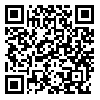BibTeX | RIS | EndNote | Medlars | ProCite | Reference Manager | RefWorks
Send citation to:
URL: http://rjms.iums.ac.ir/article-1-2770-en.html
Background: Beta
thalassemia is one of the most common hereditary disorders worldwide. In Iran,
it is frequently reported from northern and southern provinces. In order to
prevent child birth affected by this complication, prenatal screening and
diagnosis is carried out nationwide. However in some instances, this program is
unable to identify rare mutations leading to thalassemia.
Case
presentation: A
married couple, who took part in prenatal screening and diagnosis, gave birth
to a child who is affected by thalassemia major. After several molecular
examination, a rare mutation [+22 5UTR (G>A)] in compound heterozygote state
with a common mutation [codon 8 (-AA)] was found.
Conclusions: This case study
suggests that more advanced molecular evaluations must be integrated in
prenatal screening programs to identify rare mutations and antenatal diagnosis
of thalassemia cases.
| Rights and permissions | |
 |
This work is licensed under a Creative Commons Attribution-NonCommercial 4.0 International License. |





